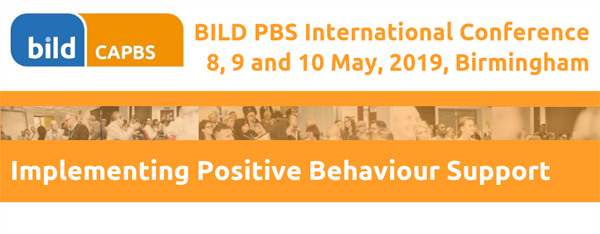NEWS
All the latest news and views from Bild.
14 May 2019
Reflections on the BILD PBS International Conference

Everyone’s PBS story begins somewhere. Mine began in a well-worn lecture theatre in the University Hospital of Wales in 1996, where I sat as a novice 22 year old graduate listening to a clinical psychologist I’d never heard of before: Gary LaVigna. The story I took from that training, which has stayed with me ever since, is that we can understand people if only we use the right tools to listen. Furthermore, the tools we use are as important as our efforts to use them, and where people can’t communicate in the usual ways and perhaps can’t tell us what’s wrong, we need to use science and observation to help us.
In the time since then, my own clinical journey took me mainly to forensic mental health, where (surprise, surprise) I found that similar principles and skills were helpful. Trying to apply them, though, wasn’t always easy. I remember an indignant commissioner telling me that a behaviour support plan wasn’t adequate to meet the commissioning guidance on care planning to manage risk because it ‘wasn’t a care plan’. I also remember battle after battle with folk trying to characterise a preference for the model as either an attempt to foist robotic behaviourism on people, or as an underhand way of trying to stop people from taking their medication. Being stubborn, and resistant to contingency management, I persisted.
Fast forward to 2014 – PBS was part of the response to the revolt and disgust engendered by Winterbourne View. Norman Lamb, whilst health minister in the coalition government, drove through “Positive and Proactive Care’ with the help of an enlightened civil service (thank you). NHS England followed through with commissioning requirements; the mental health code of practice followed; NICE followed. Now, PBS is everywhere, not as a ‘nice to have’, but as a requirement for everyone in an inpatient mental health and learning disability setting who is at risk of restrictive practice. Those conversations I had throughout the 1990s to the 2010s don’t happen now.
With the above in mind, you might expect that an international PBS conference in the UK in 2019 would be coloured by hubris. The BILD 2019 PBS international conference couldn’t have been more different. The mood was of self-criticism, questioning and reflecting on how to move forward even faster. Quite right too. Things still aren’t good enough. We still struggle to ensure that people live good lives in community social care. Person centred behaviour support planning in secondary and tertiary mental health services still hasn’t seen the widespread adoption it needs. The use of restraint isn’t falling anywhere near as quickly as it should be (and depending on your views about measurement, may even be increasing).
What was great about the talks and workshops that I attended was the relentless focus on translation and implementation, backed up by rigorous research. Professor Christine Bigby opened up Friday by telling us how important it was for organisations to focus on the quality of practice in social care by directly observing it (as well as on staffing numbers and paperwork). It’s amazing that we still have to be told this in health and social care in 2019, but we do. She topped off a brilliant talk by introducing a new measure of staff culture for use in social care – the Group Home Culture Scale, that will be of huge use in quality improvement efforts across the sector.
It was also great to see Active Support being covered in detail. Active support is like the yeast in the PBS dough – if you don’t have it, your bread doesn’t rise. And it doesn’t just help the people we support: as Prof Bigby’s research highlighted, good quality active support reduces staff attrition and increases staff satisfaction. We are all very foolish if we don’t hang onto this stuff.
Similarly, scaling up any evidence based intervention is doomed to failure if systems of resource allocation and prioritisation aren’t built in from the off. The big take away for me on this area was from Brian MacClean, who ran an amazing interactive workshop on how to triage PBS plans according to the key components of the model. He helped us think about how we can ensure that plans focus on the areas they need to, which, given resource constraints, is critical. In his keynote later in the day he presented some data showing that 85% – yes 85% – of the reduction in challenging behaviour in a community sample occurred after the first two stages of intervention had been completed – ensuring low arousal environments and building rapport. The lesson here: design your environments well, and support staff to develop relationships with people where they feel safe. Obvious, you might think, but – 85% – a number worth remembering for anyone who may be more worried about how to support staff to deliver precise technical behaviourism before first embedding them as a symbol of safety and kindness in someone’s home.
I left an amazing conference with three words in my head. “More to do!”
Dr Andrew Hider is a Consultant Clinical and Forensic Psychologist and Mental Health Act Approved Clinician. He currently works in Cardiff as Clinical Director for Ludlow Street Healthcare.
